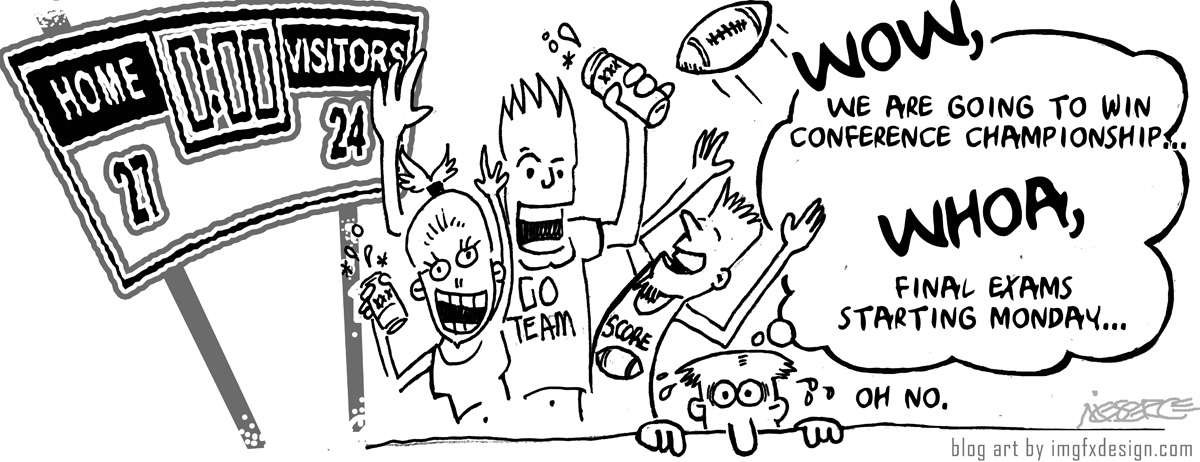 What do the following Division I football schools all have in common?: UCLA, University of Florida, Auburn University, Oregon State, University of Oregon, Northern Illinois, Cincinnati, and Troy. NCAA Conference championship games were played within two days of final exams starting.
What do the following Division I football schools all have in common?: UCLA, University of Florida, Auburn University, Oregon State, University of Oregon, Northern Illinois, Cincinnati, and Troy. NCAA Conference championship games were played within two days of final exams starting.
What do the following Division IAA/Football Championship Subdivision (“FCS”) football schools all have in common?: University of Delaware, Villanova, Appalachian State, Texas Southern, Shepherd and Minnesota Duluth. NCAA playoff games were played during the final exam period. In addition to this outright conflict, eight other schools had playoff games within two days of final exams starting.
I am a big fan of college football yet not when the December conference championship games and playoff games interfere with academic priorities. We realize how enamored the vast majority of our university students are with college football as it provides great sports excitement, school camaraderie and important socialization (partying) that may involve a major portion of the entire weekend.
Faced with a choice of attending and celebrating a conference championship game or allocating academic time to a combination of studying for upcoming final exams and completing major projects, I think we realize what happens. It takes almost insurmountable levels of maturity and discipline to turn away the lure of an exciting conference championship game that could be at home or hundreds of miles away. This is a temptation that can be avoided with proper administrative planning to preserve a productive academic environment in the important last weeks of the semester in December.
The Dilemma First Hand: Student Choices and the Unfortunate Consequences
A good example of how December college football can compromise student academic priorities occurred while teaching a Corporate Finance class. I had a student who was in the marching band for an ACC football team that had qualified to play in the conference championship in Florida on Saturday, December 5th. The last two classes of the semester were on Monday (11/30) and Wednesday (12/2).
Final exams were scheduled between Saturday, December 5th and Friday, December 11th. I had scheduled an optional additional final review class on Thursday (12/3). Late in November a student approached me about taking the final exam early as the marching band was going to be performing during halftime at this ACC conference championship game. The game was at least a ten hour drive from Atlanta and the marching band buses to Florida were leaving on Friday. Consistent with the course syllabus I told the student that permission to take a final exam early was the department head’s responsibility, not mine. I did not personally advise her to take the exam early for the stated reasons below. This was of course not very popular with her. The student’s grades going into the final exam were as follows:
Test 1: 86(22%) Test 2: 58(28%) Homework: 84(20%) …. Weighted grade average going into the final exam of 74.
I wrote the department head an email suggesting that permission not be granted for her to take the final exam early on Thursday (12/2) for the following collective reasons:
- The last regularly scheduled class was on Wednesday (12/2) which would involve the second class reviewing a comprehensive problem set that was representative of the final exam. This may not leave adequate studying time. Also, she would not have the opportunity to attend the optional Thursday class to answer any questions.
- Her low C grade performance going into the final should not be rewarded. Students with A’s should be rewarded with leniency and special privileges.
- A low performing student probably needed as much time possible to adequately prepare for the final knowing that the exam fell on the first day (12/5).
Contrary to my position, the department head allowed the student to take the exam early on Thursday (12/13). The result was a 45 on the cumulative final exam and a semester grade of a D. Apart from this disastrous Corporate Finance final, I would suspect that this student’s other course grades were impacted by this decision of making December college football a priority over academics. Final exams create an important cumulative review of both course content and practice applying concepts that should not be intercepted by football games. Refer to my posting, “The Importance of Mandatory and Cumulative Final Exams.”
The Obvious Solution: Schedule Semester Accordingly
Officers in the NCAA and college administrators should be aware and concerned that both these December conference championship and FCS playoff games directly interfere with and compromise academics. The important last two weeks of the semester, as well as the final exam week itself, are when major individual and group projects may be due and serious preparation for final exams should be occurring.
Some Division I teams may play conference championship games during the first weekend in December and then participate in the 36 Bowl Games that in 2010-2011 were scheduled between December 18 – January 10. The Bowl Games do not present a problem as evidenced by the fact that all 72 schools had completed final exams prior to the football games. However many conference championship games conflict with students properly preparing for final exams and completing major projects. UCLA, University of Florida, Auburn University, Oregon State, University of Oregon, Northern Illinois, Cincinnati, and Troy during 2010 season all had NCAA conference championship games played within two days of final exams starting.
In Division IAA there is a five week, single elimination playoff championship that in 2010-2011 began on November 27 and ran through January 7 involving 20 colleges. This resulted in six colleges having playoff games scheduled that directly conflicted with final exam period. Another eight colleges had playoff games within two days of final exams starting.
Scheduling priorities by either the NCAA or administrators can totally eliminate this situation from arising where students are enticed to choose college football over sufficient time for academics.
The NCAA Stepping Up to the Plate
For Division I, the NCAA needs to back up the entire college football season one week for universities that have conferences that play championship games following the completion of the regular season. These conferences are those typically with more than 10 teams including the ACC, SEC and Big Ten ( as of 2011), etc.
For Division IAA, the five week playoff system could be collapsed to a three week system that could easily occur after all final exams are completed. In 2010-2011 this could have taken place in the three week period between December 18th – January 7th. These playoffs would coincide with the Division I Bowl Games. Administrators whose football teams participate in the IAA/FCS conference would need to schedule final exams within the first three weeks of December which is what usually occurs.
What is ironic is the language found in the NCAA’s “Academic Integrity in Intercollegiate Athletics: Principles, Rules, and Best Practices,”
4.3 Season length and schedulingNCAA bylaws specify that member institutions shall limit season length and other scheduling elements to minimize interference with the academic programs of its athletes.
Why is the NCAA only concerned about the academic impact on the athletes and not the much bigger impact on the thousands of regular students attending these December football games?
College Administrators Delaying the Academic Season’s Opening Day
Division I college administrators need to start the semester up to one week later so that exams fall comfortably after a potential Saturday conference championship game. Final exams can easily start mid-week or at a time that assures that students have at least three or four days after a major college championship game to prepare academically for finals. With Division IAA colleges the playoffs need to be delayed and compressed from five to three weeks.
